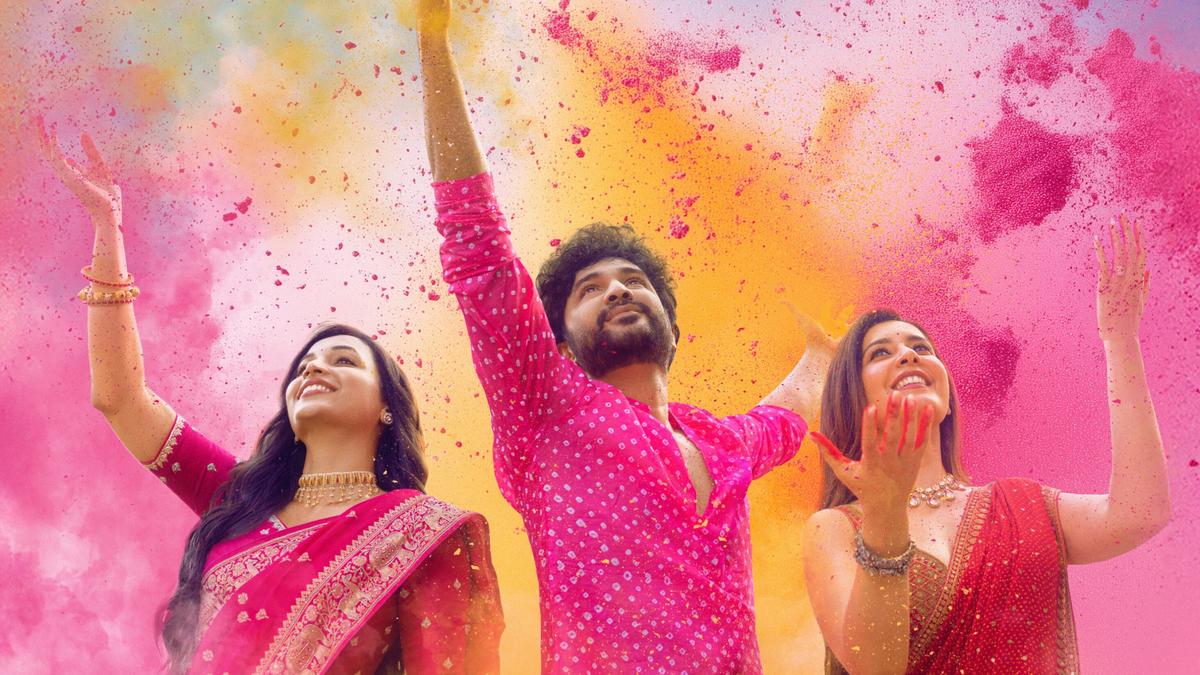
Srinidhi Shetty, Siddhu Jonnalagadda, Raashii Khanna
| Photo Credit: Special Arrangement
In an early scene from director Neerraja Kona’s Telugu romance drama Telusu Kada (loosely translated as You know it, right?), chef-restaurateur Varun (Siddhu Jonnalagadda) berates his staff for failing to meet his exacting standards. His friend and moral compass (Harsha Chemmudu) reminds him to see things more practically: for Varun, a loner, the restaurant is his world; for his staff, it is just a job.
In another moment, Varun reprimands the domestic staff at his residence when things are not spotless. His obsession with order and the luxurious spaces he inhabits mask the chaos of his personal life, particularly his complicated relationships with Raaga (Srinidhi Shetty) and Anjali (Raashii Khanna).
Costume designer-turned-director Neerraja Kona, making her writing and directorial debut, steers clear of easy sentimentality. Telusu Kada is far from a feel-good romance — the red flags are visible from the start, signalling a story that is bound to divide opinion. While she receives strong support from her production design team and cinematographer V.S. Gnanashekhar, the visual finesse cannot compensate for the gaps in writing.
Telusu Kada (Telugu)
Director: Neerraja Kona
Cast: Siddhu Jonnalagadda, Raashii Khanna, Srinidhi Shetty, Harsha Chemudu
Runtime: 136 minutes
Storyline: When a couple’s parenthood dreams come crashing, help comes from an unexpected angle. But it brings chaos than hope.
When the film opens with Varun ranting about being jilted in love and hoping for divine intervention, the perspective from which Telusu Kada unfolds becomes clear. Given Siddhu Jonnalagadda’s earlier films where his characters have faced heartbreak, particularly the Tilluseries, some of the dialogues echo familiar territory. Harsha’s character adds relief, often voicing what the audience might be thinking. When he questions why Siddhu’s characters are always caught between women and why he must witness it, the self-awareness draws a smile.

The film reveals its conflict early. The mirrored dialogues between Varun and Anjali during their matrimonial meeting hint at what lies ahead. Without giving too much away, the drama centres on the idea of family and parenthood. Things do not go as planned, and Varun’s lack of clear communication makes matters worse. His reaction to his partner’s medical situation stems from self-pity rather than empathy. By the film’s end, his backstory explains his emotional turbulence — a man masking fear with machismo. His repeated testosterone-versus-oestrogen analogy only reinforces this insecurity.
For a story built around three characters, the writing feels thin. Under the guise of cinematic liberty, Telusu Kada overlooks basic sensitivity, especially while addressing surrogacy. The narrative remains surface-level in its portrayal of the women and their circumstances.
The focus stays on the male protagonist. Varun’s contradictions are written in detail, and Siddhu captures them effectively. Here, he isn’t the talkative lead of Tillu or the conflicted yet likeable romantic of Krishna and His Leela, but a difficult man to empathise with. His dialogues, at times bordering on misogynistic, draw applause but expose the film’s uneven gaze. While Siddhu’s performance holds the character together, the writing does not justify the behaviour his partner endures.

Raashii Khanna’s character Anjali is the lone voice of reason in Varun and Raaga’s world but remains underdeveloped. She plays the part with restraint and conviction, standing her ground when needed. Srinidhi Shetty, in a morally ambiguous role, brings nuance and moves away from the conventional heroine mould, getting more space to perform.
Despite strong performances, the story feels underwritten. Telusu Kada brushes past the emotional complexity it sets up. It critiques Varun’s alpha-male traits yet allows him to dominate the narrative. The women are shortchanged — one burdened by guilt for not wanting motherhood, another forced to compromise in marriage.
The film ends on an ostensibly hopeful note, but the emotional damage it portrays is unlikely to be so easily resolved. Telusu Kada raises questions about love, ego, and communication, but stops short of answering them with the honesty it promises.
Published – October 17, 2025 03:19 pm IST



